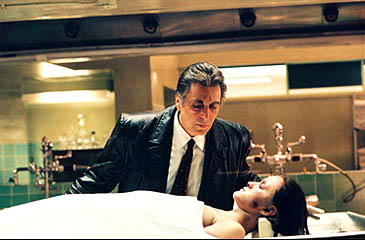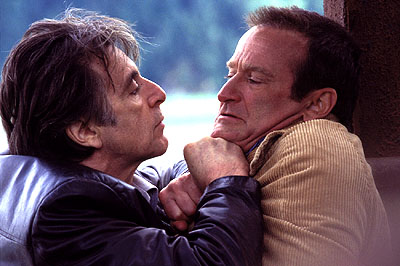

Los Angeles Detective Will Dormer (Al Pacino, Chinese Coffee, Any Given Sunday) has a big problem: he cannot sleep. Insomnia is Christopher Nolan's directorial follow-up to Memento. This is a much more straightforward film, but Nolan still is able to elicit large amounts of drama and transforms an otherwise simple detective story into a complex neo-noir movie (although the sun never sets). Insomnia is adapted by Hillary Seitz (Early Bird Special) from a 1997 Norwegian film of the same name, starring Stellan Skarsgard. The remake shifts the action from Norway to Alaska. Dormer and his partner Hap Eckhart (Martin Donovan, Custody of the Heart, Onegin) are there to help local police investigate the death of a teenage girl. The identity of the murderer is not really the point of the movie. Instead, it is how the murder and subsequent events affect the lives of the people involved.
One reason that Dormer and Eckhart are in Alaska is to shift attention away from an internal affairs investigation. Dormer is worried because he is a high profile detective, and any public investigation will force the release of numerous criminals he put away until a trial can determine his guilt or innocence. He believes that IA is trying to get to him through Eckhart. So matters complicate seriously when he shoots and kills Eckhart in the process of trying to capture the murderer. Fearing the repercussions, Dormer plants the crime scene such that it looks like the murderer shot Eckhart. One problem is that the murderer, Walter Finch (Robin Williams, Death to Smoochy, A.I.) witnessed everything. Finch confesses to Dormer, but otherwise there is no evidence he killed the girl. At this point of the year in Alaska, the sun never sets, throwing off Dormer's internal clock. He cannot sleep, the guilt of Eckhart's death is wracking him, and he cannot implicate Finch.
Yet another problem is Det. Ellie Burr (Hilary Swank, The Affair of the Necklace, The Gift). Initially, she is assisting Dormer and Eckhart in the investigation. After Eckhart's death, she is assigned to investigate the details around his death. Dormer is her idol; she studied him extensively in school, and now must face the possibility that this man she admires is flawed. The nice thing about Insomnia is that it looks fairly standard, yet as the story progresses, it becomes increasingly complex. This looks like a murder mystery, yet the search for the killer is moot. Instead, Insomnia is more about the individual characters' investigations into themselves. Nolan delves deeply into the psyches of each character, revealing hidden facets. Nobody is black or white, they all fall somewhere in-between.
Nolan does an admirable job of restraining two of the most hyperactive actors working today. Williams is absolutely frightening. Apparently, when not acting like an idiot he can actually act. Still, he is so effective because he is going against type; because he usually sinks to the level of cheap stand-up routines in his roles, a serious turn is all the more serious. Pacino is in a similar situation. The restraint he shows here gives his character much more power. The lack of unnecessary emotion lends a contemplative, calculating side to Dormer. He looks physically worse as the movie goes on. By the end, he is hunched over, his eyes are haggard, and there are wrinkles all over his face. As Dormer's physical condition worsens, Nolan ratchets the intensity up, so that the viewer can vicariously feel like him. Swank is not as good, but is much better than her post Boys Don't Cry roles. Initially, she looks like a bright-eyed rookie, but soon is able prove that she can actually handle tough police work. Insomnia is good because Nolan is there to control the actors, so not only is the story tense, the acting is on par to complement it.